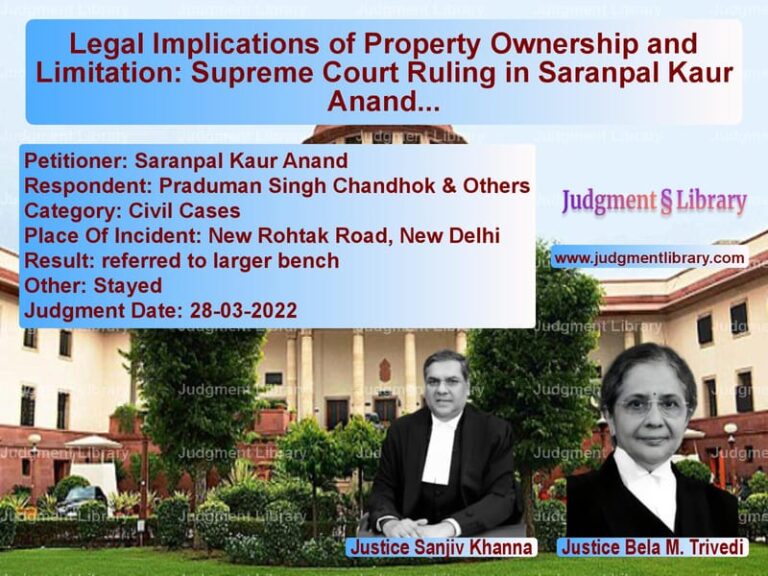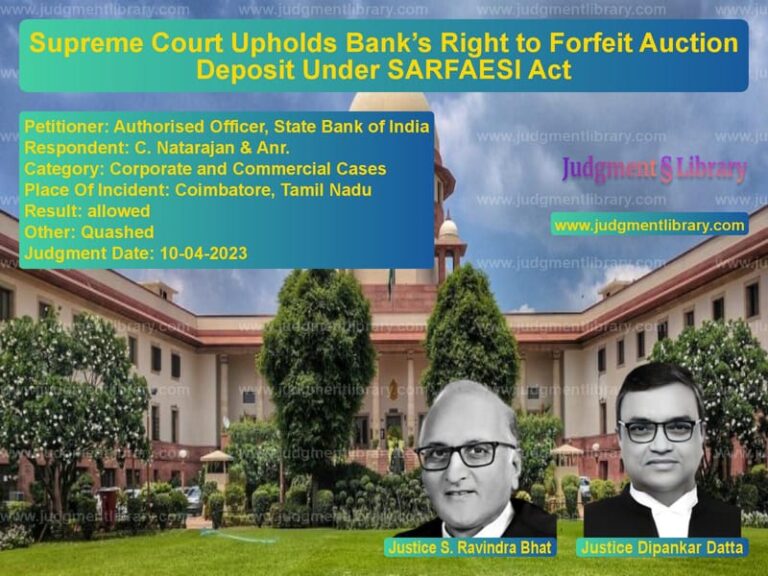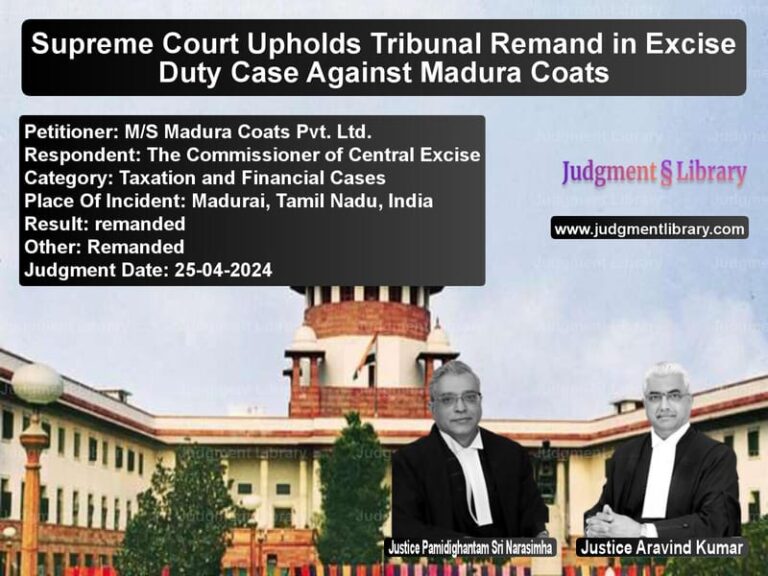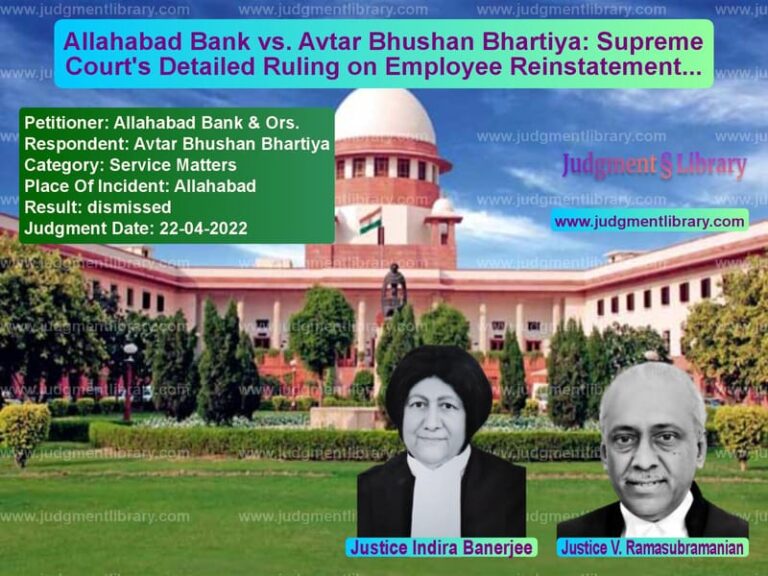Eligibility Criteria for Principal Post: Supreme Court Upholds High Court’s Decision on Teaching Experience
The case of Vivek Mudgil vs. State of U.P. & Ors. revolves around the eligibility criteria for appointment to the post of Principal in an educational institution. The Supreme Court had to determine whether the appellant met the requirement of ten years of teaching experience as mandated by the U.P. Secondary Education Services Selection Board Rules, 1998.
The appellant challenged the cancellation of his appointment as Principal on the grounds that his period of study leave should be counted as part of his teaching experience. The Supreme Court ultimately upheld the High Court’s ruling that the appellant did not fulfill the eligibility criteria and dismissed the appeal.
Background of the Case
The dispute began when the appellant, who was selected for the post of Principal, faced objections regarding his eligibility. The key events in the case were:
- On March 3, 2002, the U.P. Secondary Education Services Selection Board issued an advertisement for the post of Principal in various schools.
- The last date for submitting applications was March 30, 2002.
- The eligibility criteria required a Post Graduate degree with a minimum of ten years of teaching experience in intermediate classes.
- The appellant had been working as a Lecturer in Physics since January 12, 1990.
- Between April 15, 1992, and March 8, 1996, the appellant was on study leave, pursuing higher education in Czechoslovakia.
- On July 15, 2008, the appellant was appointed as Principal based on the selection panel prepared in 2002.
- On July 18, 2008, a complaint was filed, alleging that the appellant did not meet the ten-year teaching experience requirement.
- On December 10, 2008, the selection board canceled the appellant’s appointment.
- The appellant challenged the cancellation in the Allahabad High Court, which upheld the decision of the selection board.
- The appellant then appealed to the Supreme Court.
Legal Issues Considered
The Supreme Court examined the following key legal questions:
- Did the appellant fulfill the requirement of ten years of teaching experience?
- Could study leave be counted towards teaching experience?
- Did the High Court err in dismissing the appellant’s challenge?
- Did the exemption granted during the proceedings have a retrospective effect?
Arguments by the Appellant
The appellant, represented by counsel, made the following arguments:
- “The period of study leave should be counted towards teaching experience, as increments were granted for this period.”
- “Since the selection board initially found him eligible, the subsequent cancellation was arbitrary.”
- “An exemption order granted during the proceedings validated his selection.”
- “The requirement of ten years of teaching experience should not be considered mandatory but directory.”
Arguments by the Respondents
The respondents, represented by counsel, countered with the following arguments:
- “The eligibility criteria were clearly mentioned in the advertisement, and the appellant did not meet them.”
- “Study leave cannot be considered as teaching experience since the appellant was not engaged in actual teaching during that period.”
- “The High Court rightly held that the requirement of ten years of teaching experience is mandatory.”
- “The exemption granted during the proceedings does not have a retrospective effect and cannot validate an ineligible appointment.”
Supreme Court’s Observations and Judgment
The Supreme Court, comprising L. Nageswara Rao and R. Subhash Reddy, upheld the High Court’s ruling and dismissed the appeal. The Court made the following observations:
“As per the notification, a candidate must possess ten years of actual teaching experience. The appellant had only nine years and three months of experience as of the last date for application submission.”
The Court provided the following reasoning:
- The requirement of ten years of teaching experience was mandatory, not discretionary.
- The appellant’s period of study leave could not be counted as teaching experience.
- The selection board was correct in canceling the appointment upon discovering the ineligibility.
- The exemption granted during the proceedings did not have retrospective application and could not cure the original ineligibility.
The Supreme Court further emphasized:
“The selection and appointment of a Principal must strictly adhere to the eligibility criteria specified in the advertisement. Any relaxation in this regard would compromise the merit-based selection process.”
Implications of the Judgment
The Supreme Court’s ruling has significant implications:
- It reinforces the principle that eligibility criteria for public appointments must be strictly followed.
- It confirms that study leave cannot be considered as teaching experience for eligibility purposes.
- It prevents candidates from seeking post-facto exemptions to validate ineligible appointments.
- It ensures that selection boards have the authority to rectify errors and maintain fairness in recruitment.
Final Decision
The Supreme Court dismissed the appeal and upheld the High Court’s decision:
“The appeal is dismissed. The appellant’s appointment as Principal was rightly canceled for not meeting the mandatory eligibility criteria.”
This ruling upholds the importance of maintaining integrity in recruitment processes and ensures adherence to prescribed qualification norms.
Petitioner Name: Vivek Mudgil.Respondent Name: State of U.P. & Ors..Judgment By: Justice L. Nageswara Rao, Justice R. Subhash Reddy.Place Of Incident: Uttar Pradesh.Judgment Date: 05-12-2018.
Don’t miss out on the full details! Download the complete judgment in PDF format below and gain valuable insights instantly!
Download Judgment: Vivek Mudgil vs State of U.P. & Ors. Supreme Court of India Judgment Dated 05-12-2018.pdf
Direct Downlaod Judgment: Direct downlaod this Judgment
See all petitions in Employment Disputes
See all petitions in Recruitment Policies
See all petitions in Public Sector Employees
See all petitions in Judgment by L. Nageswara Rao
See all petitions in Judgment by R. Subhash Reddy
See all petitions in dismissed
See all petitions in supreme court of India judgments December 2018
See all petitions in 2018 judgments
See all posts in Service Matters Category
See all allowed petitions in Service Matters Category
See all Dismissed petitions in Service Matters Category
See all partially allowed petitions in Service Matters Category







